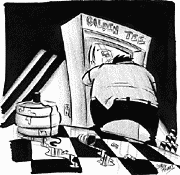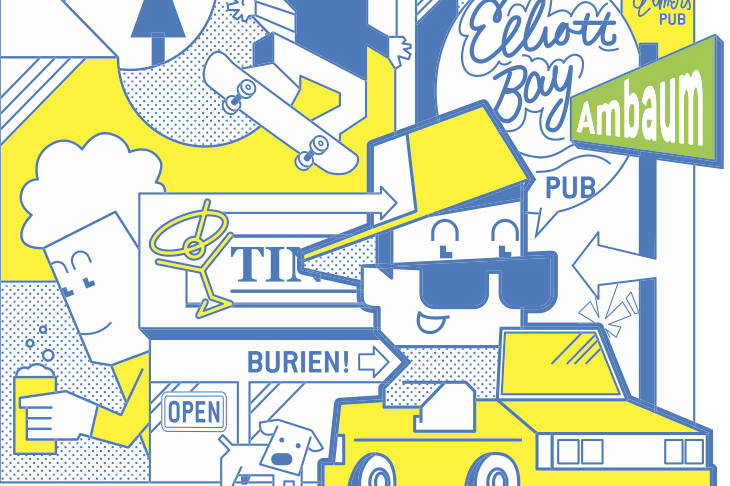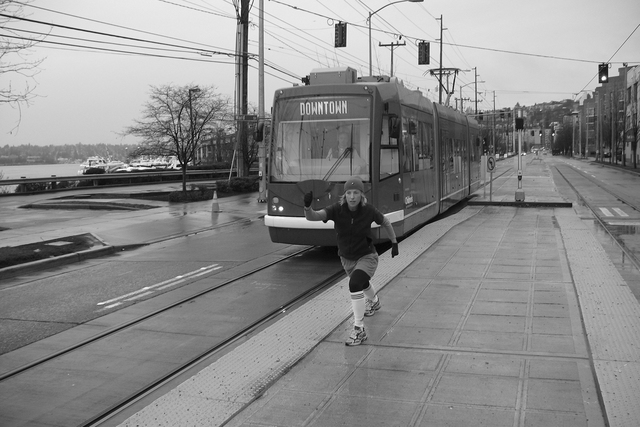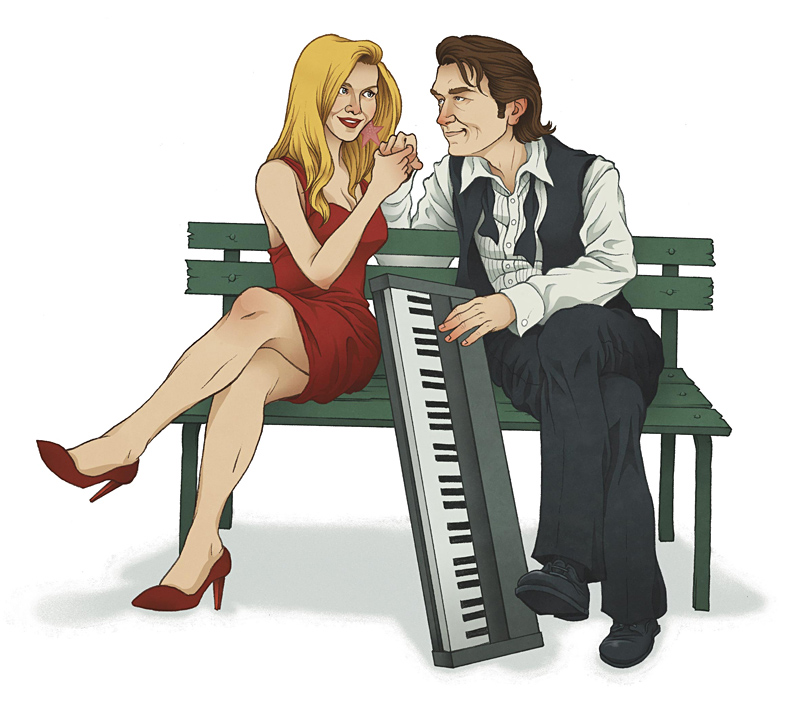IT’S LIKE NOON on a Saturday a couple months back and I’m on the 10th tee on the par three course at McMenamin’s Edgefield Drinking Resort in Troutdale, Oregon. I’m there at the resort with a group of seven couples because my buddy Brent is turning 31 that particular weekend—the specific age, of course, not having any sort of significance other than it gave us all a great excuse to take a road trip and party like college students.
While in the box, Brent and I are sipping what must be our seventh Lynchburg Lemonade of the morning—a massive level of a.m. consumption that would not have been attained were it not for an hour-long rain delay that relegated us to the clubhouse bar. Anyway, seeing as the 10th green is only 85 yards away, I walk up to the tee with a nine iron and coolly whack the ball onto the wrong fairway—30 yards directly to the right of me.
The moral of this story? I, like most Americans, suck royally at the sport of golf. I suck so bad that I have to be out of town and lathered out of my skull to even consider picking up a shaft.
This type of frustration with real-life links is music to the ears of the folks in Illinois who manufacture a video golf arcade game called Golden Tee, seemingly present in every workingman’s drinking establishment in the state of Washington. “A guy can be 4 foot 5 inches and 500 pounds and still beat anyone in the house,” boasts Marketing Director Gary Colabuno.
THE GAME’S RULES of the road are basic: there’s a big ball in the center of the machine that you pull back and slam forward with the palm of your hand. The harder you smack it, the further the video golf ball goes. If you want the ball to slice or hook, you follow the in-your-face instructions written on the faceplate. Depending on what version of the game they’re playing, players can choose from a variety of glamorously named courses such as Aspen Hills, Royal Bannockburn, Crimson Rock, and Suerte Del Sol.
With so many former arcade junkies now content to sit at home and play their favorite games on their PC or via the Internet, the coin-op arcade industry is suffering through tough times. Golden Tee, however, flies in the face of this industry trend, with virtually all revenue generated the old-fashioned way—via round, silver coins with our first president’s head on ’em.
“The PC version was a flop,” admits Colabuno. “The arcade game is more successful because of its social aspect. It brings the competitive spirit of the American male to the forefront. It’s the Pac-Man of the New Millennium.”
In essence, the game is simple, fun, and most often accompanied by pitchers of cheap, domestic lager. In other words, it’s fucking addictive.
And, by Colabuno’s estimates (which, by virtue of my own addiction, I’ll vouch for), his company’s video crack is everywhere—especially in Washington, the borders of which contain fully one-fifth (approximately 2,000, estimates Colabuno) of all Golden Tee machines nationwide. “I don’t know how to explain it, but Washington state is a total enclave for machines and talent,” says Colabuno.
I’ll explain it to you, Gary: We have a helluva lot of rain here and we like our beer. But I’ll give Colabuno this, he’s right about the talent in Washington—a trip to the Golden Tee Web site’s national leader board (the game’s most recent version, “Fore,” tracks players’ scores at http://itsgames.com.) revealed that the amount of topflight players from the Evergreen State roughly mirrored our ridiculously high concentration of the game’s machines. In fact, the winner of the company’s most recent tournament in Vegas was none other than Chuck Akin, an electrician from Spokane. Word on the street is that Chuck doesn’t quite push Colabuno’s 500-pound threshold, although it’s probably only a matter of time.
Not surprisingly, interviews with local Golden addicts revealed a high correlation between video golf and substance abuse, so much so that each of my subjects insisted that I use pseudonyms when documenting their exploits. “Jumbo,” a Wazzu grad who I found hunkered over a machine at Rory’s in Edmonds, fondly recalls his days on the machine at the Cougar Cottage in Pullman—before he “turned pro.”
“They had the machine in such proximity to the bar and the men’s bathroom that you could actually pound [beer], play, and piss an entire night away without ever leaving a 10-foot radius,” jokes Jumbo, who admits to having “masturbatory fantasies” connected to the sound of the game’s virtual commentator, an annoying video voice that chastises players who land in the woods with snide “get out the chain saw” remarks.
“Whatever the reason, it’s quite possible that I enjoy a $2.50 half hour on that machine more than I do a $75, four-hour, back-wrenching session on a real course.”
One of the most common side bets placed on the game is which player can drive the ball the furthest, something that has led to the occasional bruised palm. Mix in a few pre-round bong rips and the injurious stakes rise a bit, a lesson Ravenna Tavern course pro “Glen” learned the hard way after he and his playing partner decided to call in sick and spend the day feeding their addiction(s).
“We bought an ounce of weed, stocked up on quarters, and played all day,” recalls Glen. “I ended up at the hospital with a broken hand from trying to get the longest drive. I had to stop for about two months, which really hurt my game.”
BUT FOR ALL the endearingly twisted idiosyncrasies of pub crawlers like Jumbo, Glen, and countless others, the worst case of Golden Tee—and narcotics—addiction came in the form of a character named “Sensai,” who personally requested that pseudonym because it reflected his “unorthodox karate-chop style” of striking the ball.
A veteran of the national tourney circuit, Sensai, like Glen, also loves to smoke a fat spliff (Sensai recommends Amsterdam’s “white widow” weed) before hitting the electro-links. However, as Sensai likes to point out, there are certain occasions that merit “a little something extra,” like a tourney he claims to have won at the Aqua Velva Tavern in Miami last year.
“I figured I was in South Beach, so why not oil up my roller blades, flex my pecs, and crank out the round of a lifetime,” said Sensai. “I ended up shooting a 14-under after holing a three-wood for a two on a par five. The place went crazy.” Little did they know, however, that Sensai had a strong tail wind behind him, to say the least.
“I was firing down line after line [of coke] in the stall,” admitted Sensai. “I had never done it in a tourney, but it helped. My confidence soared and I felt like I could do anything.” But Sensai’s walk down the fairway hasn’t been all aces and flat greens.
“This game does cause depression, heavy drug use, and uncontrollable drinking,” warns Sensai. “My parents once had to literally drag me out of Mike’s Chili Parlor (in Ballard) because I was playing for 12 hours and forgot about my brother’s wedding.”
A hefty price to pay for a spot on that leader board, no doubt.








